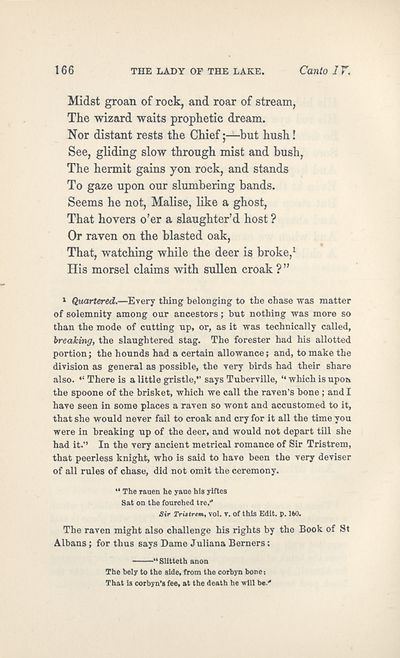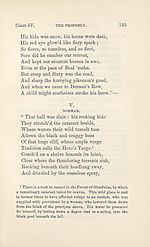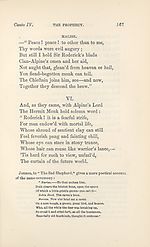Poetry > Lady of the lake
(184)
Download files
Complete book:
Individual page:
Thumbnail gallery: Grid view | List view

166
THE LADY OF THE LAKE.
Canto I r.
Midst groan of rock, and roar of stream,
The wizard waits prophetic dream.
Nor distant rests the Chief;—but hush!
See, gliding slow through mist and bush,
The hermit gains yon rock, and stands
To gaze upon our slumbering bands.
Seems he not, Malise, like a ghost,
That hovers o’er a slaughter’d host ?
Or raven on the blasted oak,
That, watching while the deer is broke,1
His morsel claims with sullen croak ? ”
1 Quartered.—Every thing belonging to the chase was matter
of solemnity among our ancestors; but nothing was more so
than the mode of cutting up, or, as it was technically called,
breaking, the slaughtered stag. The forester had his allotted
portion; the hounds had a certain allowance; and, to make the
division as general as possible, the very birds had their share
also. “ There is a little gristle,” says Tuberville, “ which is upon
the spoone of the brisket, which we call the raven's bone ; and I
have seen in some places a raven so wont and accustomed to it,
that she would never fail to croak and cry for it all the time you
were in breaking up of the deer, and would not depart till she
had it.” In the very ancient metrical romance of Sir Tristrem,
that peerless knight, who is said to have been the very deviser
of all rules of chase, did not omit the ceremony.
The rauen he yaue his yiftes
Sat on the fourched tre,”
Sir Tristrem, vol. V. Of this Edit. p. ISO.
The raven might also challenge his rights by the Book of St
Albans ; for thus says Dame Juliana Berners:
“Slitteth anon
The bely to the side, from the corbyn bone:
That is corbyn's fee, at the death he will be "
THE LADY OF THE LAKE.
Canto I r.
Midst groan of rock, and roar of stream,
The wizard waits prophetic dream.
Nor distant rests the Chief;—but hush!
See, gliding slow through mist and bush,
The hermit gains yon rock, and stands
To gaze upon our slumbering bands.
Seems he not, Malise, like a ghost,
That hovers o’er a slaughter’d host ?
Or raven on the blasted oak,
That, watching while the deer is broke,1
His morsel claims with sullen croak ? ”
1 Quartered.—Every thing belonging to the chase was matter
of solemnity among our ancestors; but nothing was more so
than the mode of cutting up, or, as it was technically called,
breaking, the slaughtered stag. The forester had his allotted
portion; the hounds had a certain allowance; and, to make the
division as general as possible, the very birds had their share
also. “ There is a little gristle,” says Tuberville, “ which is upon
the spoone of the brisket, which we call the raven's bone ; and I
have seen in some places a raven so wont and accustomed to it,
that she would never fail to croak and cry for it all the time you
were in breaking up of the deer, and would not depart till she
had it.” In the very ancient metrical romance of Sir Tristrem,
that peerless knight, who is said to have been the very deviser
of all rules of chase, did not omit the ceremony.
The rauen he yaue his yiftes
Sat on the fourched tre,”
Sir Tristrem, vol. V. Of this Edit. p. ISO.
The raven might also challenge his rights by the Book of St
Albans ; for thus says Dame Juliana Berners:
“Slitteth anon
The bely to the side, from the corbyn bone:
That is corbyn's fee, at the death he will be "
Set display mode to:
![]() Universal Viewer |
Universal Viewer | ![]() Mirador |
Large image | Transcription
Mirador |
Large image | Transcription
| Antiquarian books of Scotland > Poetry > Lady of the lake > (184) |
|---|
| Permanent URL | https://digital.nls.uk/109509122 |
|---|
| Description | Thousands of printed books from the Antiquarian Books of Scotland collection which dates from 1641 to the 1980s. The collection consists of 14,800 books which were published in Scotland or have a Scottish connection, e.g. through the author, printer or owner. Subjects covered include sport, education, diseases, adventure, occupations, Jacobites, politics and religion. Among the 29 languages represented are English, Gaelic, Italian, French, Russian and Swedish. |
|---|

